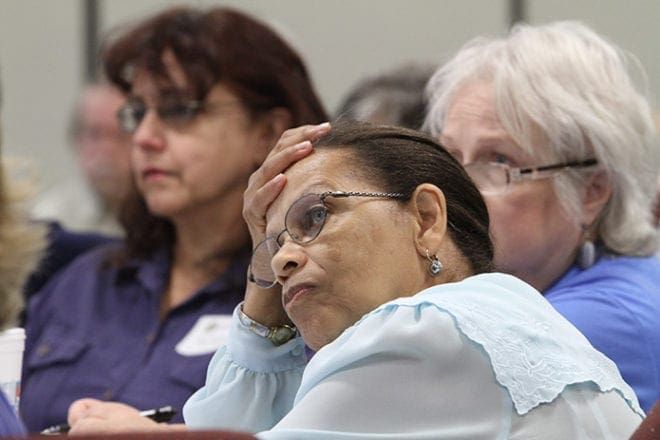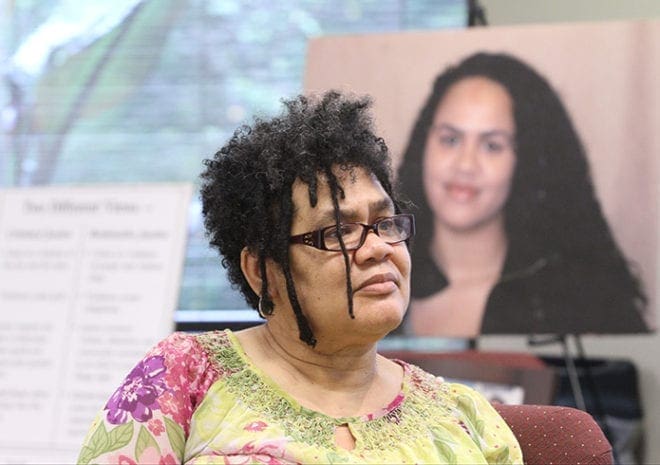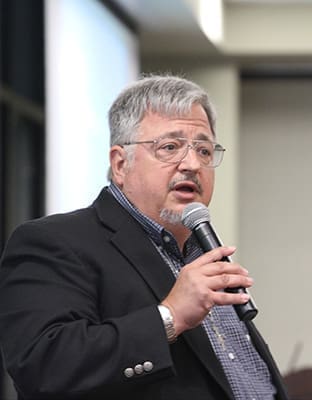During a break Christiane Belisle of St. Joseph Church, Macon, where she serves as the respect life chair, stands before one of the 21 photos documenting the timeline of an execution. The exhibit, the work of freelance photojournalist Scott Langley, is called a “Journey Into the U.S. Death Penalty.” Photo By Michael Alexander
Smyrna
Event underscores faith perspective on death penalty
By NICHOLE GOLDEN, Staff Writer | Published August 7, 2014
SMYRNA—More than 85 people, at varying stages in the journey to oppose capital punishment, attended an inaugural event of Georgia Catholics Against the Death Penalty Aug. 2 at the Chancery of the Archdiocese of Atlanta.
“Restoration, Reconciliation and Forgiveness: A Catholic Perspective on the Death Penalty” featured speakers, group discussions, a question-and-answer session and afternoon Mass.
Some of those who attended have long been involved in prison ministry, while others are just beginning to learn more about the church’s teachings regarding the death penalty.
Lisa Gerold, parishioner of St. Peter Chanel Church in Roswell and a lay Carmelite, has always believed use of the death penalty is wrong. Gerold began writing letters to offer spiritual support to a prisoner in one of Georgia’s correctional facilities about a year ago.
“Life is not ours to take,” said Gerold. Having more information, made available through awareness events, helps her to speak “a little more confidently” about her position.

(Clockwise from center) Linda Ryan of St. Paul of the Cross Church, Atlanta, Frances Rentas of St. John Vianney Church, Lithia Springs, and Gail Fredericks of St. Joseph Church, Marietta, hang on every word from John Starbuck, as he shares the story of his stepdaughter’s killing, his opposition to the death penalty and his feelings on restorative justice. Photo By Michael Alexander
The program featured three speakers who have direct experience either through ministry or by providing legal representation to death row inmates: Sister of Mercy Camille D’Arienzo, a contemporary of Congregation of St. Joseph Sister Helen Prejean and author of the audiobook “Stories of Forgiveness”; Florida attorney Dale Recinella, author of “Now I Walk on Death Row”; and Amy Vosberg-Casey, staff attorney with the Georgia Resource Center, a nonprofit law office providing free representation to death row inmates.
“It’s a lot different than people who think they know what they’re talking about,” said Gerold about the presentations.
When discussing capital punishment, Gerold used the analogy of a parent not giving up on a child just because they had done something wrong, but rather attempting to correct the child.
“I think what happens is you shut down your heart,” Gerold said of pursuing the death penalty.
Other speakers at the program were John and Kimberly Starbuck, parents of shooting victim Meleia Willis-Starbuck. John Starbuck, who also lost his retired police officer grandfather to murder, talked courageously about forgiveness.
Meleia, Starbuck’s stepdaughter, was killed when a friend fired a gun into the air to break up a fight. She was a freshman at Dartmouth College and very active in social justice, including work with homeless and battered women.
“I thought of what Meleia stood for,” said Starbuck, who first met her when she was 9 months old.
When Starbuck’s grandfather was murdered years prior, an uncle pushed for the death penalty in conjunction with the crime.
“I disagreed with him. I did not say anything. I was so numb to life thereafter,” said Starbuck.
Two men were convicted in the grandfather’s death. The older of the two was a model prisoner, turned his life around, and has been out of prison for 20 years. The younger of the two was just 17 when he went into prison, suffered abuse there and died out on the street after parole.
“He became the worst of the worst,” said Starbuck. “They don’t have the resources to get out of it,” he said.
Meleia’s killing was not a death penalty case, and the perpetrator, Chris Hollis, received a sentence of more than 20 years for voluntary manslaughter. Starbuck felt that the young man could be reformed and supported the minimum sentence versus life in prison.
Starbuck said he doesn’t judge the families of murder victims who support the death penalty as punishment for the crime that took the life of their loved one.
“For me, it was a question of justice on a larger scale,” he said.
Starbuck’s wife, Kimberly, spoke briefly about the loss of her daughter and in support of her husband.
“This has become John’s passion,” she said.
In the months following Meleia’s death, Kimberly would get in the car late at night, calling John to ask why she shouldn’t drive off a cliff.
“Our lives are changed forever. I will never recover from that,” she said.

Kimberly Starbuck sits before an image of her late daughter Meleia. In 2005 Meleia, 19, was the victim of a shooting. Starbuck and her husband John travel around the country speaking on forgiveness from the family’s point of view. Photo By Michael Alexander
Recinella is a lay chaplain serving on behalf of the Catholic bishops in Florida’s prisons including death row, which has 400 inmates. A lawyer who surrendered the right to practice in order to help death row inmates, Recinella spoke at length about restorative justice, an approach that seeks to repair the harm done and that focuses on both victims’ families and the families of inmates.
Recinella said that the two most isolated groups are the families of the condemned and the families of murder victims.
“Nobody knows how to deal with that pain,” he said.
Recinella emphasized that in his view every execution is a homicide.
In Florida, the death row cells are 6-by-9 feet without air conditioning.
“They are being held in cages until we kill them,” said Recinella.
Years ago, Recinella nearly died from a bacterial infection after eating a raw oyster. He didn’t just have a near death experience.
“No, I got the lecture,” said Recinella. “(God) told me what he thought about what I was doing with his gifts.”
And what Recinella said in response to God was “give me another chance.”
It was a Southern Baptist preacher who called Recinella and invited him to come to a prison on Florida’s panhandle. He told the man he’d pray about it, trying to buy himself time, but his family all voted in favor.
Now he’s known as “Brother Dale” and prays with both Catholic and non-Catholic inmates, while his wife supports the families of prisoners and victims.
Recinella said that retired wardens are finally talking about what participating in executions is doing to the staff members.
“Killing is not for them,” he said.
He spoke of the three traumatized daughters of a man set to die, who had to be peeled away from his last embrace. “Killing is not for them,” he repeated.
The death penalty offers a “circle of torment,” he said.
Recinella posed the question aloud that most want to ask. “What about the victim’s family?”
He related the story of a young woman who came to witness the execution of the man who murdered her beloved aunt. Everyone kept telling her, “You’ll feel better. You’ll have closure,” he said.
After the inmate died, the loved one stood up with fists raised and said, “Is that it? Is that all there is?”

Dale Recinella, a lawyer and a chaplain to Florida’s death row and solitary confinement population, talks about the death penalty and how God led him to prison ministry. Photo By Michael Alexander
Many supporters of the death penalty will use Scripture such as an “eye for an eye” when discussing their stance. Recinella spent five years researching the death penalty as the law of the early Hebrews. He found that the death penalty provided for in Jewish law featured 44 mandatory requirements of substantive law and procedural law to determine how and when someone was executed. Recinella compared America’s death penalty to that of the Bible’s and found that it didn’t match up with a single requirement.
“They cannot support the death penalty based on Scripture,” said Recinella. “Restorative justice is God’s justice.”
Vosburg-Casey of the Georgia Resource Center is currently working with one death row inmate who has a “strong innocence claim.”
The Nebraska native said her Catholic upbringing focused on the “seamless garment of life,” and she has taken it to heart in her work.
The Georgia Resource Center defends 80 to 90 percent of the inmates on death row.
“We are not to take life at any stage,” she said. But her true motivation is the “blessing I have to get to know these people that society has thrown away,” she said.
Vosburg-Casey acknowledges that the majority of those sentenced to death have killed someone.
“That’s not something I overlook or forget,” she said.
Everyone can play a critical role in fighting against the use of the death penalty, but her focus is narrower.
“My focus is saving my client from death … from execution,” said Vosburg-Casey.
Participants received information from the U.S. Conference of Catholic Bishops, statistics on the use of the death penalty, prayers and Scripture that support abolishing the death penalty. A Declaration of Life, widely distributed by Sister D’Arienzo, was included in a packet of information. The form is a personal declaration that can be admissible in court as a victim’s statement should the signer be murdered. It states non-support of execution as a means of punishment.
A collection of black and white photos called “Execution Night” by Scott Langley was on exhibit for the program.
The event also included a remembrance of the late Father Austin Fogarty, who died in January. Father Fogarty visited the death row inmates at the Georgia Diagnostic and Classification State Prison in Jackson weekly, praying with them, celebrating Mass and baptizing some.
“He had been doing that for a long time,” said Deacon Richard Tolcher, director of the archdiocesan prison and jail ministry. “Let us offer this day for him.”